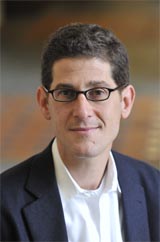
Brian A. Jacob, CESifo guest in May 2014
Obtaining Better Quality Teachers
According to CESifo visiting researcher Brian A. Jacob, three approaches are necessary to obtain better quality teachers.
1) The teacher evaluation and compensation systems must be restructured. We should de-emphasise experience and instead evaluate teachers on the basis of student performance.
2) Teacher compensation should be reconfigured to pay a premium to teachers in hard-to-staff subjects and/or schools. Given the current labour market, it is simply more expensive to hire a teacher for high-school chemistry than general elementary education. Forcing salaries to be equal across fields simply ensures that teachers in hard-to-staff fields will be less qualified than their peers.
3) Finally, we should invest more to devise and evaluate professional development programmes, which would include both new-teacher mentoring as well as further subject-specific professional development.
Mr Jacob’s primary fields of interest are labour economics, programme evaluation and the economics of education. His current research focuses on school accountability, teacher labour markets and virtual schooling. He also conducts research and teaches in applied microeconomics, applied policy, politics, institutions & processes as well as quantitative methods.
Brian Jacob is the Walter H. Annenberg Professor of Education Policy, Professor of Economics and Professor of Education at the University of Michigan. He is Co-Director of the Education Policy Initiative (EPI) and former director of the Center for Local, State and Urban Policy (CLOSUP), as well as a Research Associate at the National Bureau of Economic Research (NBER).
He has previously served as a policy analyst in the NYC Mayor’s Office and taught middle school in East Harlem. In 2008, Jacob received the David N. Kershaw Prize, an award given every two years to honour persons who, at under the age of 40, have made a distinguished contribution to the field of public policy. He received his BA from Harvard College and his PhD from the University of Chicago.
